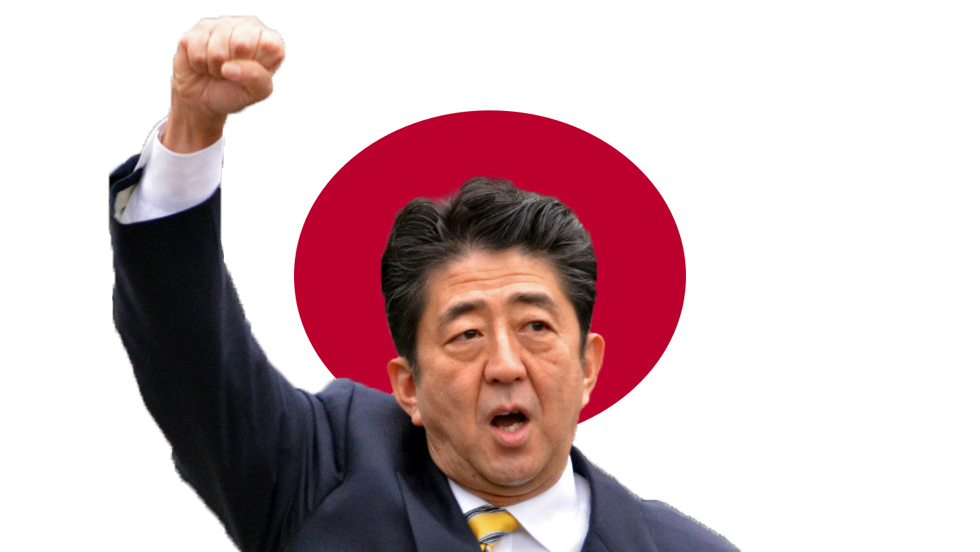

New Delhi: Under Shinzo Abe, nationalism is finally making a comeback in the island country.
Abe’s reelection has proved that the Japanese people take the threat from North Korea seriously. Voters have given a solid mandate to Abe’s Liberal Democratic Party in the lower house of the parliament. The ruling coalition already holds a majority in the upper house.
Abe announced snap elections in September to diffuse the national crisis over growing threat from belligerent North Korea.
The threat against Japan increased after sanctions were announced against the North Korean regime.
“Japan is no longer needed to exist near us,” the state-run Korean Central News Agency said, citing a statement by the Korea Asia-Pacific Peace Committee. “The four islands of the archipelago should be sunken into the sea by the nuclear bomb of Juche,” the committee said, referring to the North’s ruling ideology. “Let’s reduce the U.S. mainland into ashes and darkness. Let’s vent our spite with the mobilization of all retaliation means which have been prepared till now,” the committee said.
Over the past months, North Korea has tested six missiles, with each test either falling into the Japan Sea or passing over Japan to land in the Pacific. Abe and his conservative coalition have been attempting to rebuild Japan’s military capabilities and to scrap its WWII-era constitution that forbids aggression.
Increased military spending
Prime Minister Abe and many present and former LDP ministers are also known members of Nippon Kaigi. The Nippon Kaigi is a Japanese nationalist unincorporated association that was established in 1997 and has approximately 38,000 members. The group is influential in the legislative and executive branches of the Japanese government through its affiliates.
Abe has already pledged to reshape the post-war Japanese policy of building a robust military. In March this year, he declared that Japan will not cap military spending below one percent of the nation’s economy, reaffirming his commitment to go further than other postwar governments.
In August, his minister of defense submitted a historic budget request that violated decades-old unwritten principle for Japan’s defense budget to never be larger than 1 percent of GDP. This principle was part of the commitment made after WWII to forever renounce military aggression.
According to this new budget request, Japan needed 5,255 billion yen in military spending (US$48.1 billion) or 2.5 percent of Japan’s GDP for the fiscal year 2018. One of the most important requests was to include land-based missile defense systems to monitor space and provide auto-warnings for missile launches.
Given the rise of Chinese military power and assertiveness, Prime Minister Abe is tightening the alliance with the United States, and promoting security cooperation with powerful Asian countries like India that share his concerns about China.
Who made North Korea a nuclear power?
North Korea started to develop nuclear technology in 50s but the country received a major boost when it signed a nuclear cooperation agreement with the Soviet Union in 1959.
In 1962, the Soviets helped North Korea set up its first nuclear research facility – Yongbyon Nuclear Scientific Research Center. The Soviets even helped North Korea set up its first nuclear reactor in 1964 which was used to produce radioactive isotopes for medicinal, industrial and research purposes.
Last month, Pakistani nuclear scientist Dr. Abdul Qadeer Khan said that North Korea’s nuclear technology was much better than his country’s.
Dr. Abdul Qadeer Khan is known as the father of Pakistan’s nuclear programme and has visited North Korea twice. “Their scientists are highly capable, and most of them have studied in Russia,” he said.
Khan stated that Russia and China were two countries that would not leave North Korea’s side, based on their anti-US stand.
In conclusion, due to the growing threat from North Korea and a thumping majority in the recently concluded election, Abe finally has the chance to fulfill his long-term dream of amending article 9 and arming the Japanese military to counter the North Korean threat.








